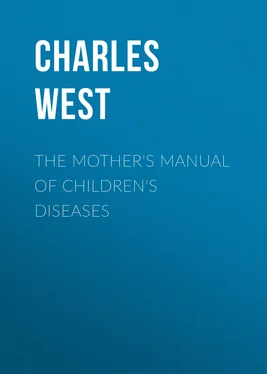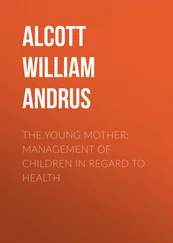Charles West - The Mother's Manual of Children's Diseases
Здесь есть возможность читать онлайн «Charles West - The Mother's Manual of Children's Diseases» — ознакомительный отрывок электронной книги совершенно бесплатно, а после прочтения отрывка купить полную версию. В некоторых случаях можно слушать аудио, скачать через торрент в формате fb2 и присутствует краткое содержание. Издательство: Иностранный паблик, Жанр: Руководства, Медицина, foreign_desc, на английском языке. Описание произведения, (предисловие) а так же отзывы посетителей доступны на портале библиотеки ЛибКат.
- Название:The Mother's Manual of Children's Diseases
- Автор:
- Издательство:Иностранный паблик
- Жанр:
- Год:неизвестен
- ISBN:нет данных
- Рейтинг книги:5 / 5. Голосов: 1
-
Избранное:Добавить в избранное
- Отзывы:
-
Ваша оценка:
- 100
- 1
- 2
- 3
- 4
- 5
The Mother's Manual of Children's Diseases: краткое содержание, описание и аннотация
Предлагаем к чтению аннотацию, описание, краткое содержание или предисловие (зависит от того, что написал сам автор книги «The Mother's Manual of Children's Diseases»). Если вы не нашли необходимую информацию о книге — напишите в комментариях, мы постараемся отыскать её.
The Mother's Manual of Children's Diseases — читать онлайн ознакомительный отрывок
Ниже представлен текст книги, разбитый по страницам. Система сохранения места последней прочитанной страницы, позволяет с удобством читать онлайн бесплатно книгу «The Mother's Manual of Children's Diseases», без необходимости каждый раз заново искать на чём Вы остановились. Поставьте закладку, и сможете в любой момент перейти на страницу, на которой закончили чтение.
Интервал:
Закладка:
What wonder is it that in such circumstances the body should waste most rapidly; for it is forced from its own tissues to supply those elements essential to the maintenance of life, which its food contains in far too scanty a proportion. Every organ of the body contributes to the general support, and life is thus prolonged, if no kind disease curtail it, until each member has furnished all that it can spare, and then death takes place from starvation, its approach having been slower, but the suffering which preceded it not therefore less, than if all food had been withheld.
Do not suppose that in this description I have been painting too dark a picture, or that children who die thus have been exceptionally weak, and so under the acknowledged difficulties of hand-feeding at length became consumptive. They do not die of consumption, and in a large number of instances their bodies show no trace of consumptive disease, but present appearances characteristic of this condition of starvation, and of this only.
Along the whole track of the stomach and intestines are the signs of irritation and inflammation. The glands of the bowels are enlarged, actual ulceration of the stomach is often met with; while so far-reaching is the influence of this slow starvation, that even the substance of the kidneys and of the brain are often found softened and otherwise altered, though it might not unreasonably have been supposed that these organs lay quite beyond the reach of any disorder of digestion.
No doubt all these grievous results do not always follow; and sometimes children exceptionally strong manage to take and digest enough even of unsuitable food to maintain their health, and may as they grow up, and the changes take place in the system which fit it for a varied diet, even become robust. In the majority of instances, however, hand-fed infants, and those especially who have been brought up chiefly on farinaceous food, are less strong than others, and are more apt to develop any latent tendency to hereditary disease, such as scrofula or consumption, than members of the same family who have been brought up at the breast.
Enough has already been said to satisfy all but those who do not wish to be convinced, how incumbent it is on every mother to try to suckle her child. But though it is most desirable that for the first six months of their existence children should derive their support entirely from their mother, and that until they are a year or at least nine months old their mother's milk should form the chief part of their food, yet many circumstances may occur to render the full adoption of this plan impracticable. In some women the supply of milk, although at first abundant, yet in the course of a few weeks undergoes so considerable a diminution as to become altogether insufficient for the child's support; while in other cases, although its quantity continues undiminished, yet from some defect in its quality it does not furnish the infant with proper nutriment. Cases of the former kind are not unusual in young, tolerably healthy, but not robust women; while instances of the latter are met with chiefly among those who have given birth to several children, whose health is bad, or among the poor, who have been enfeebled by hard living or hard work. The children in the former case thrive well enough for the first six weeks or two months, but then, obtaining the milk in too small a quantity to meet the demands of their rapid growth, they pine and fret, they lose both flesh and strength, and, unless the food given to supply their wants be judiciously selected, their stomach and bowels become disordered, and nutrition, instead of being aided, is more seriously impaired. In the case of the mother whose milk disagrees with the child from some defect in its quality, the signs are in general more pronounced. Either the infant vomits more than that small quantity which a babe who has sucked greedily or overmuch often rejects immediately on leaving the breast, or it is purged, or it seems never satisfied, does not gain flesh, does not thrive, cries much and is not happy. In these cases, too, the mother's supply of milk, though abundant at first, diminishes in a few weeks; she feels exhausted, and suffers from back-ache, or from pain in the breasts each time after the child's sucking; while, further, her general weakness leaves her no alternative but to wean the child.
Knowing the attempt to rear her child entirely at the breast to be vain, the mother may in such cases be tempted to bring it up by hand from the very first. But how short soever the period may be during which the mother may be able to suckle her child, it is very desirable that she should nurse it during that period, and also that her milk should then constitute its only food. For the first four or five days after the infant's birth the milk possesses peculiar qualities, and not merely abounds in fatty and saccharine matter, but presents its casein or curd in a form in which it is specially easy of digestion. These peculiarities indeed become less marked within a week or two; but not only is it of moment that the infant should at any rate make its start in life with every advantage, but the mother who nurses her little one even for a month avoids thereby almost half the risks which follow her confinement. For the indolent, among the wealthy, a numerous class who have but to form a wish in order to have it gratified, a wet-nurse for the baby suggests itself at once to the mother as a ready means of saving herself trouble, and of shirking responsibility. This course, to which love of pleasure and personal vanity tend alike to prompt her, often finds, in spite of all opposing reasons, the approval of the nurse, to whom it saves trouble, and the too ready acquiescence of the doctor in a course which pleases his patient. But many circumstances besides those moral considerations, which ought never to be forgotten before the determination is formed to employ a wet-nurse, may put this expedient out of the question, and it becomes therefore of importance to learn what is the best course for a mother to adopt who is either wholly unable to suckle her child, or who can do so only for a very short time.
It is obvious that the more nearly the substitute approaches to the character of the mother's milk, the greater will be the prospect of the attempt to rear the child upon it proving successful. There is no argument needed to prove that the milk of some animal more closely resembles the mother's milk, and is more likely to prove a useful substitute for it than any kind of farinaceous substance. The milk of all animals, however, differs in many important respects from human milk, and differs too very widely in different animals. Thus, the milk of the cow and that of the ewe contain nearly double the quantity of curd, and that of the goat more than twice the quantity of butter, and it is only in the milk of the ass that the solid constituents are arranged in the same order as in man. On this account, therefore, asses' milk is regarded, and with propriety, as the best substitute for the child's natural food. Unfortunately, however, expense is very frequently a bar to its employment, and compels the use of the less easily digested cows' milk. But though the cost may be a valid objection to the permanent employment of asses' milk, it is yet very desirable when a young infant cannot have the breast, that it should be supplied with asses' milk for the first four or five weeks, until the first dangers of the experiment of bringing it up by hand have been surmounted. The deficiency of asses' milk in butter may be corrected by the addition of about a twentieth part of cream, and its disposition to act on the bowels may be lessened by heating it to boiling point, not over the fire but in a vessel of hot water; and still more effectually by the addition to it of a fourth part of lime-water or of a teaspoonful of the solution of saccharated carbonate of lime to two ounces or four tablespoonfuls of the milk.
Читать дальшеИнтервал:
Закладка:
Похожие книги на «The Mother's Manual of Children's Diseases»
Представляем Вашему вниманию похожие книги на «The Mother's Manual of Children's Diseases» списком для выбора. Мы отобрали схожую по названию и смыслу литературу в надежде предоставить читателям больше вариантов отыскать новые, интересные, ещё непрочитанные произведения.
Обсуждение, отзывы о книге «The Mother's Manual of Children's Diseases» и просто собственные мнения читателей. Оставьте ваши комментарии, напишите, что Вы думаете о произведении, его смысле или главных героях. Укажите что конкретно понравилось, а что нет, и почему Вы так считаете.











